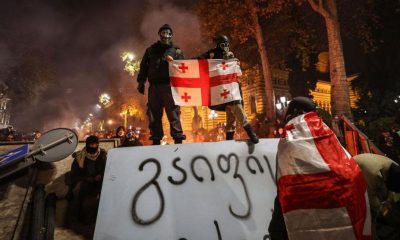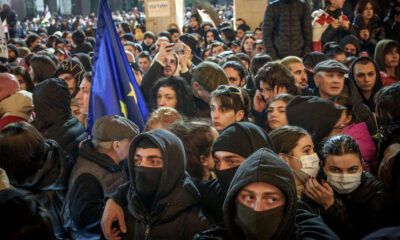International
Trans woman killed in Georgia day after anti-LGBT law passed

Trans woman killed in Georgia day after anti-LGBT law passed
One of Georgia’s most well-known transgender women has been killed in her home, a day after the country’s parliament passed a major anti-LGBT bill.
Local officials say Kesaria Abramidze, 37, was stabbed to death in her flat in the capital Tbilisi on Wednesday.
A 26-year-old man has been arrested in the case that has shocked the small South Caucasian nation. Georgian media reported he was known to the victim.
Rights groups have linked the killing to the new anti-LGBT law, arguing the government’s promotion of it had fuelled transphobic hate crime.
Georgian President Salome Zurabishvili, who opposed the new law, said the “horrendous murder” raised urgent questions about hate crimes and discrimination.
The legislation from Prime Minister Irakli Kobakhidze’s government severely restricts rights for LGBT people.
It introduces a ban on same-sex marriage, gender-affirming surgeries, child adoption by non-heterosexuals and the promotion of same-sex relationships in schools.
The bill sailed through parliament on Tuesday in an 84-0 vote, despite criticism from rights groups.
The ruling party said the “Protection of Family Values and Minors” bill was designed to protect a majority of Georgians seeking protection from “LGBT propaganda”.
But local LGBT rights campaigners said the government had used homophobic and transphobic language and ideas in promoting the bill.
Several activists directly linked what they said was the government’s harmful rhetoric to the killing of Ms Abramidze.
READ ALSO:
- Super Eagles maintain 39th position in latest FIFA ranking
- JUST IN: Petrol price to drop as marketers pay N766/litre for Dangote PMS
- Prison official kills colleague over food in Bauchi
One of the first openly trans public figures in the country, she had represented Georgia in international trans pageants and had more than 500,000 followers on social media.
“Political homophobia, biphobia, and transphobia have become central to the government’s official discourse and ideology,” said local human rights group the Social Justice Center.
“Kesaria Abramidze’s killing cannot be viewed separately from this overall grave context,” it added.
Progressive politicians outside the country have also linked the killing to the government’s legislative agenda.
“Those who sow hatred will reap violence. Kesaria Abramidze was killed just one day after the Georgian parliament passed the anti-LGBTI law,” wrote German lawmaker Michael Roth, the social democratic chair of the country’s foreign affairs committee.
European Union figures had already condemned the legislation when it passed earlier this week, saying it further jeopardised the country’s stated aim of joining the EU.
Josep Borrell, the EU’s foreign policy chief, said the law was “further derailing the country from its EU path”. He called on the Georgian government to withdraw the law.
The legislation undermines the “fundamental rights of the people” and increases discrimination and stigmatisation, he added.
The British embassy has also expressed “serious concerns”.
Rights groups have characterised the Georgian legislation as being similar to Russian laws which severely restrict LGBT rights.
The Washington-based think tank Freedom House said the bill was “pulled directly from the Kremlin’s authoritarian playbook”.
Trans woman killed in Georgia day after anti-LGBT law passed
BBC
International
Ceasefire negotiations: Trump ‘very angry’ with Putin

Ceasefire negotiations: Trump ‘very angry’ with Putin
Donald Trump has said he is “very angry” and “pissed off” with Russian President Vladimir Putin after weeks of attempting to negotiate a ceasefire in Ukraine.
In an NBC News interview, the US president criticised Putin for attacking Ukrainian President Volodymyr Zelensky’s credibility, and threatened to impose a 50% tariff on countries buying Russian oil if he did not agree to a ceasefire.
Last week, Putin suggested the possibility of a UN-run government in Ukraine to organise new elections and then begin peace talks.
Trump’s comments mark a change in tone towards Putin. Over the past six weeks, Trump has publicly harangued Zelensky and demanded numerous concessions from Ukraine’s president.
In turn, he has flattered Putin and largely given in to the Russian president’s demands.
European leaders had worried that Trump was cosying up to Putin.
But Trump’s comments on Sunday appeared to be a departure from that dynamic. It is the first time the US has seriously threatened Russia with consequences for dragging its feet in ceasefire negotiations, which would seem to put the diplomatic ball back in Moscow’s court.
NBC News reported that, in a 10-minute phone interview, Trump said he was very angry and “pissed off” when Putin criticised the credibility of Zelensky’s leadership, although the president has himself called Ukraine’s leader a dictator and demanded that he hold elections.
“You could say that I was very angry, pissed off, when… Putin started getting into Zelensky’s credibility, because that’s not going in the right location,” Trump said.
“New leadership means you’re not gonna have a deal for a long time,” he added.
READ ALSO:
When speaking about Putin, Trump said that the Kremlin knew of his anger, but noted that he had “a very good relationship” with the Russian leader and “the anger dissipates quickly… if he does the right thing”.
If Russia does not follow through with a ceasefire, Trump threatened to target its economy further if he thought it was Putin’s fault.
“If Russia and I are unable to make a deal on stopping the bloodshed in Ukraine, and if I think it was Russia’s fault – which it might not be… I am going to put secondary tariffs… on all oil coming out of Russia,” he said.
“There will be a 25% tariff on oil and other products sold in the United States, secondary tariffs,” Trump said, noting that the tariffs on Russia would come in a month without a ceasefire deal.
Secondary tariffs are sanctions on countries that do business with another country. They could constitute up to 50% on goods entering the US from countries still buying oil from Russia. The biggest such buyers by a long margin are China and India.
Zelensky wrote on social media following the interview that “Russia continues looking for excuses to drag this war out even further”.
He said that “Putin is playing the same game he has since 2014”, when Russia unilaterally annexed the Crimean peninsula.
“This is dangerous for everyone – and there should be an appropriate response from the United States, Europe, and all our global partners who seek peace.”
Trump said he would speak to Putin later in the week.
Moscow says the current Ukrainian authorities are illegitimate as President Zelensky has stayed in power beyond the end of his term and is therefore not a valid negotiating partner.
But Zelensky has stayed because elections have been put on hold, legally by martial law and practically by the chaos of war.
It would be almost impossible to hold a valid election with more than five million Ukrainian citizens displaced overseas and many hundreds of thousands away from home fighting on the front line.
READ ALSO:
- Ex-Rivers HoS wife cries for help over husband’s safety
- Fubara reacts as Ex-HOS, Nwaeke accuses him of bombing oil pipelines, Rivers Assembly
- Natasha: Emmanuel Uduaghan threatens to sue Senator Nwaebonyi
Russia launched a full-scale invasion of its neighbour, Ukraine, in February 2022. It currently controls about 20% of Ukrainian territory.
More than 100,000 people fighting for Russia’s military have now died as the war in Ukraine enters the fourth year, according to data analysed by BBC Russian, independent media group Mediazona and volunteers who have been counting deaths since the war began.
Ukraine last updated its casualty figures in December 2024, when President Volodymyr Zelensky acknowledged 43,000 Ukrainian deaths among soldiers and officers. Western analysts believe this figure to be an under-estimate.
Also in the NBC interview on Sunday, Trump said he was “not joking” when he said he would not rule out seeking a third term in the White House, despite it being prohibited by the US Constitution.
“A lot of people want me to do it,” Trump said. “But, I mean, I basically tell them we have a long way to go.”
During the call with NBC, he also again threatened to bomb Iran if it did not agree to a nuclear deal. Trump earlier this month sent a letter to the regime demanding negotiations.
“It will be bombing the likes of which they have never seen before,” he said, noting he would also impose secondary tariffs.
On Sunday, Iran’s president Masoud Pezeshkian said the country would not enter into direct negotiations with Washington concerning their nuclear programme, but indirect talks were possible.
“We don’t avoid talks; it’s the breach of promises that has caused issues for us so far,” he said. “They must prove that they can build trust.”
Ceasefire negotiations: Trump ‘very angry’ with Putin
BBC
International
In pictures: Eid celebrations around the world
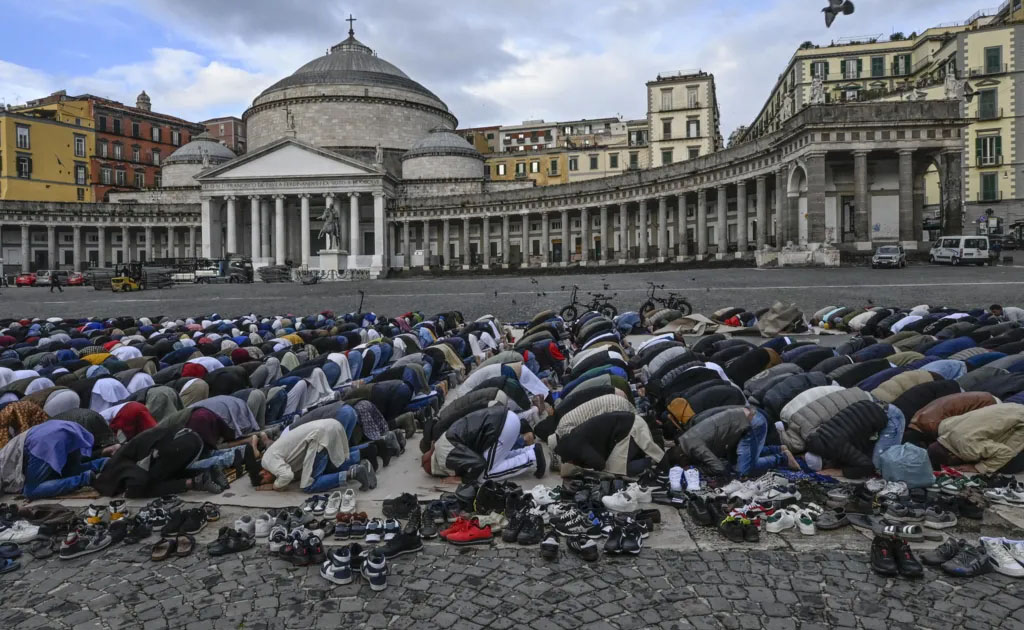
In pictures: Eid celebrations around the world
Muslims around the world are celebrating Eid al-Fitr, one of the biggest celebrations in the Islamic calendar.
Eid al-Fitr – which means “festival of the breaking of the fast” – is celebrated at the end of Ramadan, a month of fasting for many adults, as well as spiritual reflection and prayer.
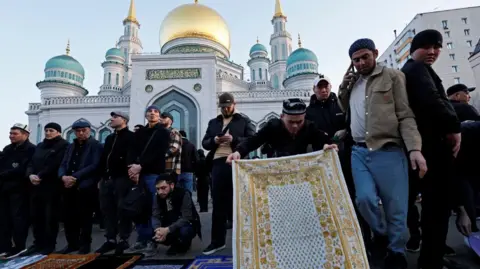
Here in Moscow, worshippers are seen preparing for prayer.
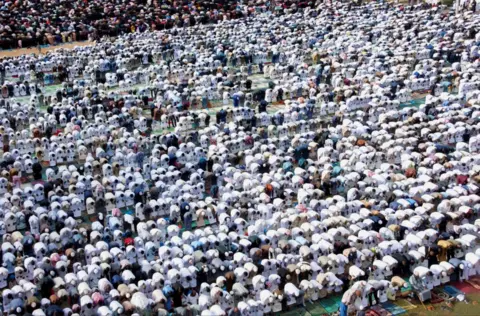
Hundreds took part in prayers at Tononoka grounds, in Mombasa, Kenya
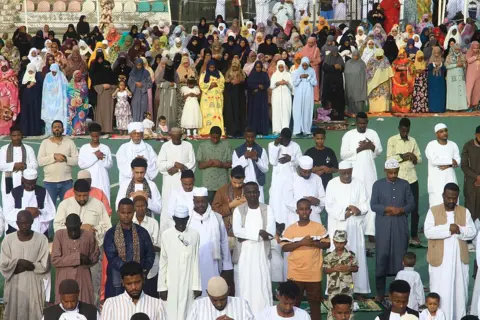
Prayers were also observed at a stadium in Port Sudan in the east of the country
READ ALSO:
- Ex-Rivers HoS wife cries for help over husband’s safety
- Fubara reacts as Ex-HOS, Nwaeke accuses him of bombing oil pipelines, Rivers Assembly
- Natasha: Emmanuel Uduaghan threatens to sue Senator Nwaebonyi
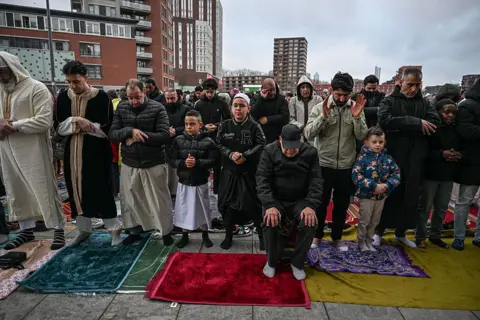
Little children joined adults at the Moskee Essalam in Rotterdam, Netherlands

Gifts are handed out to Muslim children in Lviv, Ukraine, as Russia’s war on the country continues
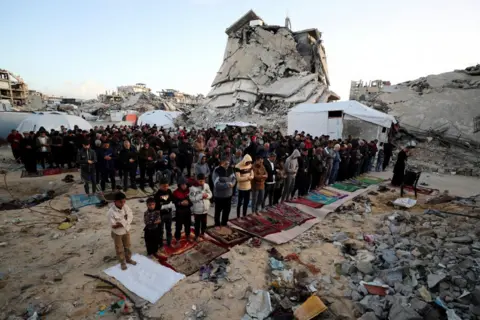
Palestinians in Jabaliya in the northern Gaza Strip pray amidst the rubble of a mosque destroyed in the current war between Israel and Hamas

Families gather at al-Aqsa mosque in Jerusalem – the third holiest site in Islam
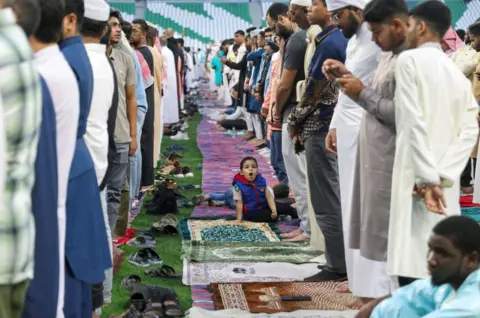
A boy yawns during prayers at a stadium in Qatar
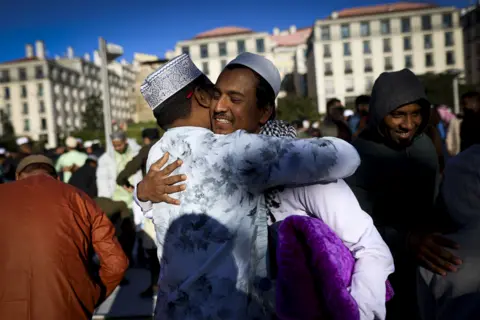
Muslims greet each-other at Martim Moniz Square in Lisbon, Portugal
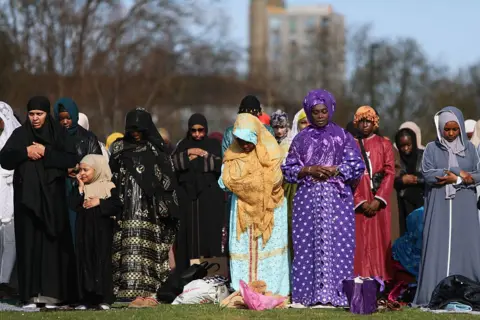
Women worshippers gather in Burgess Park, London, for an outdoor prayer
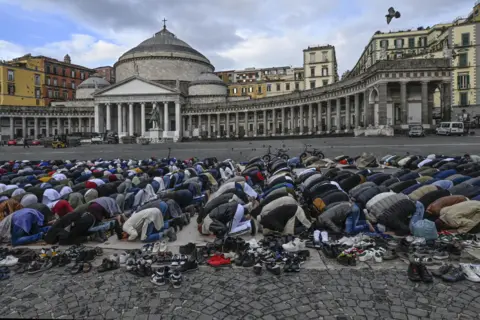
There were also worshippers gathered outside Plebiscito Square in Naples, Italy
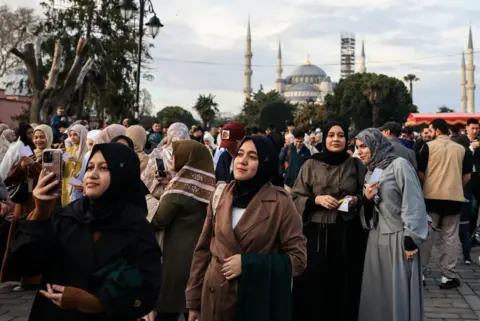
Some women took pictures after attending prayers at the Hagia Sophia Grand Mosque in Istanbul, Turkey
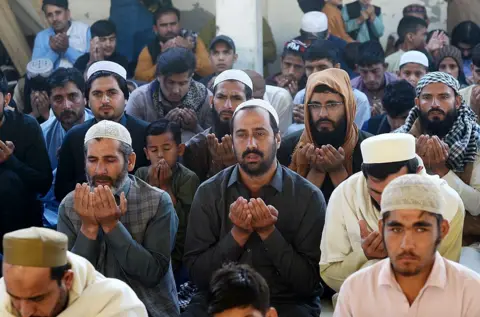
Afghan refugees pray at a mosque on the outskirts of Peshawar, Pakistan
In pictures: Eid celebrations around the world
BBC
International
Search for survivors continue as death toll in Myanmar earthquake exceeds 1,600

Search for survivors continue as death toll in Myanmar earthquake exceeds 1,600

The death toll in Myanmar earthquake hit 1,644, the military government said on Saturday, according to BBC, CNN, Reuters and other reports.
In neighbouring Thailand, where the quake rattled buildings and brought down a skyscraper under construction in the capital Bangkok, at least nine people were killed.
Survivors in Mandalay, Myanmar’s second-biggest city, dug with their bare hands on Friday in desperate attempts to save those still trapped, lacking heavy machinery and with authorities absent.
In Bangkok on Saturday, rescue operations continued at the site of the 33-storey tower’s collapse, where 47 people were missing or trapped under the rubble – including workers from Myanmar.
The US Geological Service’s predictive modelling estimated Myanmar’s death toll could exceed 10,000 and losses could exceed the country’s annual economic output.
A day after making a rare call for international assistance, Myanmar’s junta chief, Senior General Min Aung Hlaing, travelled to hard-hit Mandalay near the epicentre of the quake, which brought down buildings and triggered fires in some areas.
Chairman of the State Administration Council instructed authorities to expedite search and rescue efforts and address any urgent needs,” the junta said in a statement on state media, referring to Min Aung Hlaing.
Airports closed
An initial assessment by Myanmar’s opposition National Unity Government said at least 2,900 buildings, 30 roads and seven bridges had been damaged by the quake.
“Due to significant damage, Naypyitaw and Mandalay international airports are temporarily closed,” said the NUG, which includes remnants of the elected civilian government ousted by the military in a 2021 coup that triggered the civil war.
The control tower at the airport in Naypyitaw, Myanmar’s purpose-built capital city, collapsed, rendering it inoperable, a person with knowledge of the situation told Reuters.
Hospitals in central and northwestern Myanmar were struggling to cope with the influx of injured people, the U.N. Office for the Coordination of Humanitarian Affairs said, warning that damage to roads was hindering access.
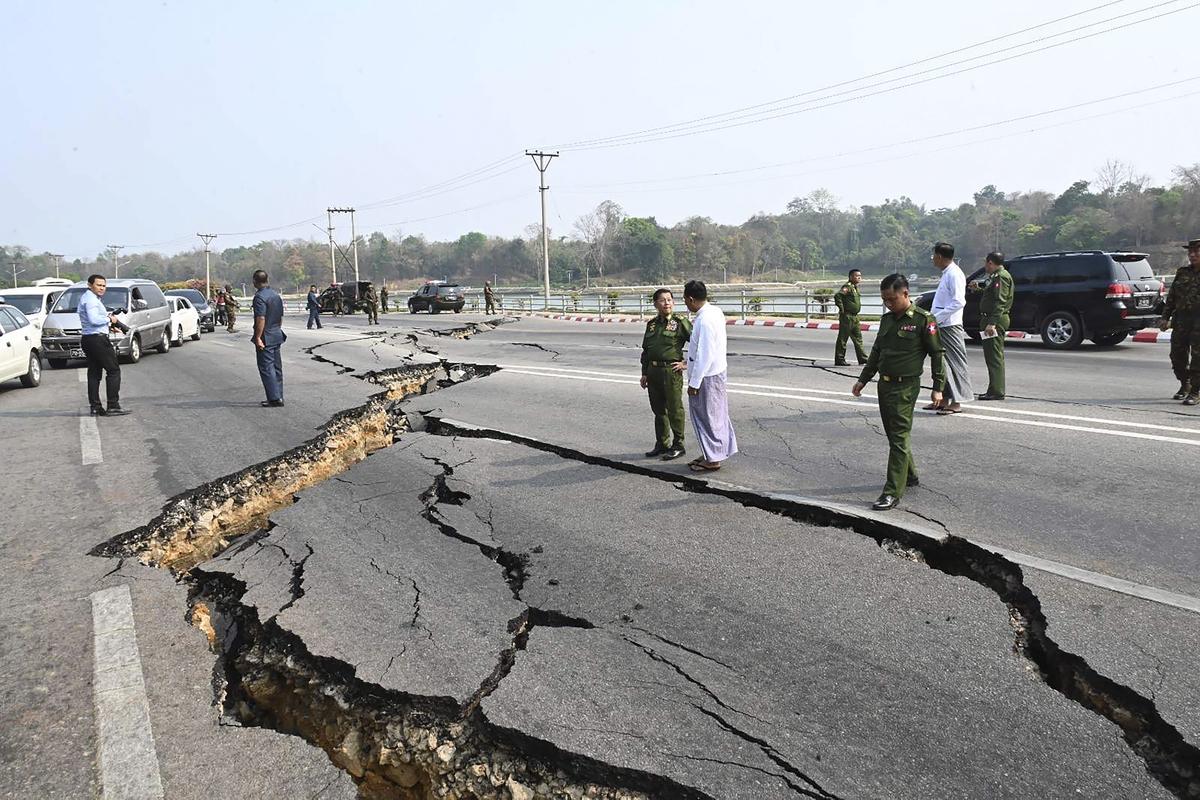
Seventeen cargo trucks of shelter and medical supplies were due to arrive on Sunday to address shortages of medicines, including blood bags and anaesthetics, the agency added.
Chinese President Xi Jinping spoke by phone with the junta chief, China’s embassy in Myanmar said on Saturday, and said Beijing would provide $13.77 million worth of aid, including tents, blankets and emergency medical kits.
The United States, which has a testy relationship with the Myanmar military and has sanctioned its officials, including Min Aung Hlaing, has said it would provide some assistance.
Relief supplies from India on a military aircraft also landed in Yangon, according to Myanmar state media, and India’s government said it was also dispatching ships with 40 tonnes of humanitarian aid.
Russia, Malaysia and Singapore were also sending planeloads of relief supplies and personnel.
-

 Uncategorized2 days ago
Uncategorized2 days agoBreaking: Moon sighted in Saudi, UAE, others, Eid-Fitr holds Sunday
-

 metro2 days ago
metro2 days agoRamadan ends in Nigeria, Sultan announces March 30 as Eid-el-Fitr
-

 metro2 days ago
metro2 days agoFubara reacts as Ex-HOS, Nwaeke accuses him of bombing oil pipelines, Rivers Assembly
-

 metro2 days ago
metro2 days agoEmbrace environmental sanitation during Eid-Fitr, LAGESC boss tells Lagosians
-

 Opinion2 days ago
Opinion2 days agoBarbaric mass burning of innocents in Edo, by Farooq Kperogi
-

 metro2 days ago
metro2 days agoEx-Rivers HoS wife cries for help over husband’s safety
-

 metro2 days ago
metro2 days agoNatasha: Emmanuel Uduaghan threatens to sue Senator Nwaebonyi
-

 Auto2 days ago
Auto2 days agoLanre Shittu Motors to endow Automobile Department of Lagos Technical College

